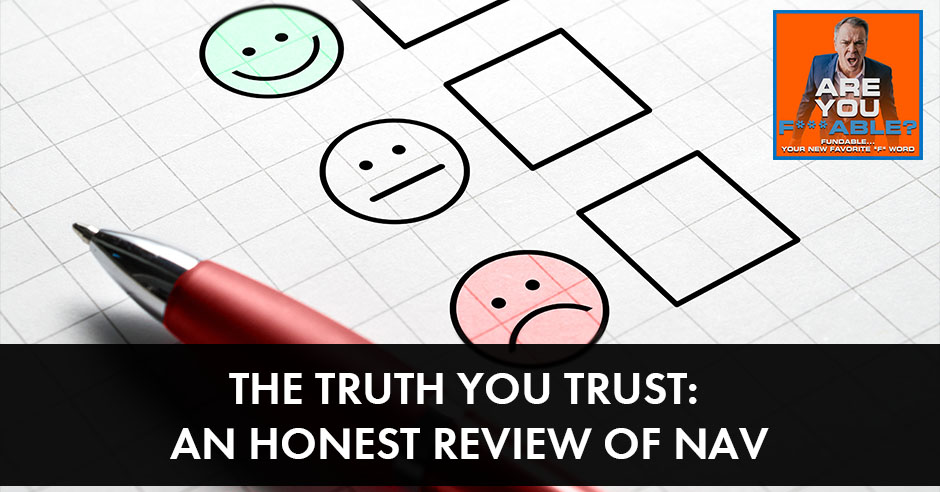
In this day and age, everyone can be lured by fake business credit and schemes. It’s up to us to spot and identify those liars, cheaters, and thieves. In this episode, Merrill Chandler discusses the business credit equivalent to CreditKarma.com and does a deep dive into the misrepresentations of what business credit is and what these guys say they can do for us. He also talks about credit offers and Nav.com reports to get you financing, build your business credit, and give you certain business credit reports.
—
Watch the episode here
Listen to the podcast here
The Truth You Trust: An Honest Review of Nav
Credit Card Offers
In this episode, we’re going to be discussing the business credit equivalent to CreditKarma.com. We’re doing a deep dive into the misrepresentations of what business credit is and what these guys say that they can do for us. This episode is called Liars, Cheaters and Thieves. As I promised, we’re going to be talking about Nav.com. I encourage you to go there and follow along. Nav reports to get you financing, build business credit and gives you certain business credit reports. We’re going to be discussing several of those things but what we’re most interested in are the credit offers. I’m reading an email that was sent to me and it says, “We found 29 business credit cards you likely qualify for.”
When you click on, “See my top credit card options.” Remember business credit card offers, they are saying that these are for your business. We’ve been down this path together, but this is an example after you’ve done all of the bingeing about business credit, what business credit is, what business credit is not, now you get to see how other groups translate this. When we click on that button, we end up coming to the homepage. At the top, they start, “We found financing for you,” and it’s BlueVine. 15% to 78% and weekly payment terms, 6 to 12 for $5,250. Apply now. It says there’s a match factor of 96%. That 96% is simply usually within a particular range. Remember how we talked about in previous episodes, there is not the credit score, but there is the range. There is a tier of scores. When they’re fishing to put me on their information, they’re using tiers.
We’re going to find out right now what tiers they mean. Notice they say that my business credit at CreditSense is Dun & Bradstreet. We got an A grade, but on Experian, they’re giving us a B and Equifax, those are the three business credit reporting, they’re saying that I have a D. How is it so different? We asked those things about, “Why is there so big a range between our personal and the three different bureaus at the personal credit bureau level and our personal credit scores?” The problem is that all three of these have different grading structures. Everybody is trying to stake their claim as the business credit reporting feature. As we talked about in previous episodes on the personal side, the owner of the data, the credit reporting agency cannot also grade that data. That’s why we have FICO or third parties or there’s VantageScore. Now, while it’s a FAKO score, it’s separate from the credit bureaus.
A cash card is not a credit card #GetFundable Share on XDun & Bradstreet grades their own. Experian grades their own. Equifax grades their own. Here’s what I know. I am fastidious about my data points that are required for automatic underwriting to get the lowest costs on the highest credit lines and loans possible. A D is crazy because it’s the same data. I have no late pays. I have no anything. I’ve checked this out before I did this episode. There are no derogatory accounts. They’re referring simply to aging. I’ve been doing this a long time. In subsequent episodes, we’re going to do a deep dive going into Dun & Bradstreet. I’ll show you my stuff and I’ll compare all of these.
Merrill’s myFICO
Now, the next thing I want to show you, which is a complete travesty is a notice on the personal credit they’re listing me under VantageScore, FAKO score, a 747. Let me show you what we’re going to look at when it comes to my personal borrower profile. Let’s look at myFICO. I’m pulling myFICO up, my score is 771, 775 and 779. It’s legit. It’s on myFICO.com, the exact place that I tell you guys to go do all of your stuff. Remember, I’ve got an eight-point spread. Remember how we talked about you want to be under ten points? I practice what I preach. Here’s my eight-point spread, Merrill Chandler. Notice what it’s saying. It’s saying 747. That is seriously a 40 to a 50-point difference between FICO and VantageScore.
I did show you the FICO eight because those are the scores that we’re comparing. They’re using an unweighted score here because that’s all VantageScore has. Remember we’ve talked about it. All VantageScore can offer is an unweighted score. I want to show you what they are showing me. The only thing good about this Nav that isn’t misleading is that they do offer the small business scoring service for an upgraded account. I have not grabbed that. I had it once upon a time. I learned the metrics that they’re measuring and I stopped subscribing. What we want to do is we want to make sure we understand they do offer small business scoring services. It costs them so they passed that along versus all of these are promotional accounts. That’s my first page.

How To Spot Cheaters: American Express notoriously pays the highest fees for referrals.
Credit Cards
Let’s go to the second page. When we look at credit cards, it takes me to my list of 29, my 29 most likely. It also gives a match factor. If you hadn’t binged this show, you wouldn’t know this stuff. American Express Blue Business cash card, the thing is a cash card is not a credit card. American Express Blue Business is a charge card. That means you have to pay. It’s my number one match factor. American Express notoriously pays the highest fees for referrals. We’ll count how many American Express is in the top ten. They pay the highest fees when you refer to a cardholder. If I said apply now and I filled this out, they would make up to $200 for that referral. That’s how Nav like Credit Karma for the personal makes its money. I’ve got nothing against making money, but tell people what they’re getting.
Discover Business Card
American Express Blue Business, this is a charge card and charge cards as we know, I downgrade them by 20% because they don’t have a limit. Nobody can do calculations on the utilization. We don’t get rewarded by utilization. The terms of this card in my vetting, you have to pay this at the end of the month or create a special arrangement with them where there are fixed terms. It acts as an installment loan and it turns into a mess. Let’s take a look at the Discover it Business Card. Discover reports to your personal profile. They pay good money but it reports to your personal. Discover does not do it.
In my last vetting, no Discover card continues. They never have, I don’t know if they ever will, but no Discover card is pure business. It reports to your personal. Let’s go down to the blue, notice it is a credit card. Each one of these descriptions is joint between the offer of the card and the programming by the Nav or whoever is hosting the site. Some of this information does link through. It’s not on Nav, but notice that’s the whole point of what we’re learning is to understand who’s offering what, what’s good for us and what’s bad for us. This is a credit card and as my last vet of the fall of 2019, this card does not report to your personal profile.
The better your profile and the better your score, that's what's going to drive lower and lower interest rates #GetFundable Share on XIt would be an appropriate card, no annual fee, 14% to 20%. Remember how I said that to the best of my knowledge, FICO does not help with approvals. Your FICO score helps with the rate and terms. The better your profile and the better your score, that’s what’s going to drive lower and lower interest rates. Those are the top three. Notice Capital One Spark, what have we said about Capital One Spark? It’s a big fat boo because we do not support you getting a Spark business card because it reports to your personal. Every time it reports to your personal, every time you use it for the business, that is going to trigger too high of utilizations and those utilizations are what’s going to harm your personal profile. No to Capital One.
Charge Cards
American Express is a Tier 2. Notice since this is a Tier 2, but instead of it being 100%, it’s 80%. It gets downgrade 20% because it’s a charge card. This is a Tier 2 100%. Discovery is Tier 2. It reports to your personal. It’s horrible. Capital One is Tier 2, but it’s Spark so it’s horrible. Bank of America, finally, I’m down to my fifth one. This is a Tier 1, 100% card. This 100% is important because of our vetting and we teach you in our boot camp to make sure you’re vetting them in real-time. This is a true business card. It does not report to your personal, it only reports to the business. Bank of America has two of those back to back.
It comes in and we’re back to Spark as cash select for business and the Business Platinums. The Platinum is a charge card because notice there’s only one mention of a credit card here. All the other ones are charge cards. It’s very important to understand the language and know what’s being referred to. Capital One is no good. We’ve got Bank of America Platinum. Notice it says credit card and every one of the ones that we’ve talked about is credit card and credit card. You see what we’re looking for now that you know, as the good book says, have eyes to see and ears to hear.

How To Spot Cheaters: SBA loans are Small Business Administration-backed like a student loan.
You know what to look for you, we have to practice looking for it. We could go on, there are 29 of them, but just so you know every single one of these, you must vet to make sure that in real-time when you’re ready to apply that you have used the tools from my book or from the bootcamp and you have vetted each one of these calls. It continues on and on. I’m down to 70% match factor. Kabbage is not a financial institution. They are not currently a depository institution. Brex is not a depository institution. Notice, you want depository institutions. This is American Express but it’s also co-branded. It loses 20%. Hilton Honors American is Tier 2 like your personal. It’s Tier 2 at 20% loss for being co-branded.
The usage is a little different because of certain factors that we’ll get into in a different episode. Brex for a startup, I want you to be forewarned. My credit score, according to VantageScore is 747, but I have 0% match factor for all of these cards, the US banks, the Capital One Spark Classic for business. I can’t even get one that’s going to report to my business. I don’t know if this is a real thing because a perfectly crafted personal borrower profile at 770 according to FICO. Remember when they pull a credit report, they’re not going to pull a VantageScore. That’s for me. That’s because they don’t want to pay the money to tell me what is true about my credit score by using FICO.
They’re using VantageScore. Every one of these, I’m in the 770s. I do not know how much of what the match factor represents because I don’t know. Maybe I have to show things that I’m not a match. I’ve never been denied a single credit card that I’ve attempted. Let’s look up financing. When we click on financing, advertiser and editorial disclosure. That’s weird. First things first. We’ve matched you to six types of financing. If you go onto this website, there are only six types of financing. There are term loans, but notice the BlueVines, the costs are enormous. These are all FinTech types. These are going to cost you significantly in interest. There are weekly payments for 6 to 12 months.
It’s very important to understand the language and know what's being referred to #GetFundable Share on XThe repayment terms daily or weekly up to 36 months were on deck. Most of these offers, when you apply, will do a soft pull and see whether or not you get approved. Those are the things that you have to look at. We’ve got term loans. These are loans. We’ve got lines of credit. Notice these lines of credit, they’re not listing business lines of credit from Tier 1, Tier 2 or even community banks and credit unions. These, once again, BlueVine, Headway Capital, weekly or monthly for 12 to 24 months and 6 to 12 months. I’m not saying these are bad. I’m saying that the costs are exorbitant because these are non-traditional, non-depository institution credit instruments.
They’re going to cost you for acquiring them. There are cash advance loans. These cash advance loans are basically willing to finance if you have accounts receivable, etc. There’s invoice financing. This is also an accounts receivable. There’s equipment financing all the way down to SBA loans. If you need an SBA loan, do not go to a subprime lender, get an SBA loan, qualify through Tier 1, Tier 2, your local community banks. The vast majority of depository institutions have SBA loans because SBA loans are Small Business Administration-backed like a student loan is, Fannie, Freddie is backed. These are business loans that are backed, however, you like the terms faith and credit of the US government.
Do not go to these institutions if you’re going to create this because what you’re looking at is these are designed to charge you more for higher rates. What you do want to realize is that when you’re looking at these types of institutions that they are subprime. There’s every likelihood or chance that when you use them, you’re also going to be paying interest. It’s the equivalent of hard money. That’s my review of Nav. There are a couple of things that I ultimately want to show you, but we’re going to put them in a different episode. Stay tuned in the next few episodes we’re going to be discovering the building of business credit and what is business credit and what’s not. What are true legitimate business credit building strategies and what are the farces out there that they’re going to pitch to you. Be careful out there. Keep bingeing so that you can do everything in your power to stay on the true business credit. Learn the mechanics of building an amazing fundable business and leveraging your personal fundable profile to get the financing you need. We’ll talk to you soon.




